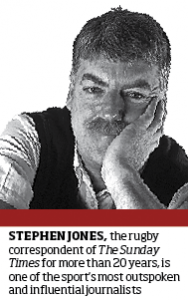
Fallen angel? The Angel of the North sculpture, near Gateshead, is a symbol of a proud region going through hard times on the rugby field
This is not to sound patronising or like a northern send-up à la Monty Python. But probably my happiest times in rugby reporting concern the consumption of mushy peas – in the clubhouse at Orrell. In the days before TV producers started dictating to rugby’s paying public exactly when games would be allowed to begin, almost all top-class club rugby in England took place on a Saturday and was all the better for it. As often as possible, I headed for Orrell. Magnificent club.
 Orrell were one of the best teams of the era. They had superb facilities and were run on love and passion, not money. When they were at their peak just before professionalism, they were a frighteningly good side, they fielded the most massive pack ever spotted, and the signature forward was the marvellous Bob Kimmins, the gigantic lock who was a stirring sight.
Orrell were one of the best teams of the era. They had superb facilities and were run on love and passion, not money. When they were at their peak just before professionalism, they were a frighteningly good side, they fielded the most massive pack ever spotted, and the signature forward was the marvellous Bob Kimmins, the gigantic lock who was a stirring sight.
And the mushy peas? Orrell had the most convivial and appetising food in the sport. Some of my colleagues and I used to travel up to the North on the Friday so as to be in perfect position for our pre-match nosh. I’ve lost count of the number of storming matches I saw at Edge Hall Road. Or the number of narrow escapes we had as a taxi took us away just as the likes of Simon Langford, Dave Cleary and Sammy Southern were in their dangerous post-match stride.
Over the years, it was also possible to see Liverpool St Helens, West Hartlepool and Waterloo play in the top tier. It was also sad when Wakefield had to fold, and Yorkshire rugby folk of my acquaintance are always telling me that the club should be reformed at least to do justice to a proud history.
But what do we have now in the North? Orrell are way down the leagues, victims of the pro era. Leeds Carnegie are in the second flight. Newcastle are at the foot of the Premiership, and are anxiously recruiting to try to save themselves. Sale are more of a success story but after a disastrous start to last season they had to fight like mad to avoid relegation. After clearing out almost their whole playing staff last season when operating under the misguided Mike Brewer, they appear to have done exactly the same under the charge of the more rational Steve Diamond.
But the truth is that the sport is increasingly anxious about its presence in the North. Unless Newcastle can rally and escape the drop, it could easily be that by next season only Sale are operating at the elite level at any point in England north of Leicester. We’re used to rugby league running a sport with hardly any representations from giant tracts of the country, but not rugby union.
Let us get one thing straight: a gigantic fallacy has arisen surrounding the travails of northern rugby as if there is some compelling inner reason, some in-built catastrophe, which prevents a successful pro club operating in Manchester or above. It’s as if simply being in the North means you can’t have a successful union team.
This is patent nonsense. The economy is a little more vibrant elsewhere in England but not devastatingly so. The first thing that those charged with producing top clubs in the North should do is look in the mirror. Being in the North never stops you from choosing the right coach or making good deals in the transfer market. I yield to no one in my admiration for Dave Thompson, the ebullient former owner of Newcastle, who did a huge amount to establish the club. But under him, Newcastle made far too many bad coaching appointments and bad signings. With the greatest respect, I was amazed that Newcastle opted for Alan Tait as their most recent coach.
Nor have the club ever been particularly wise with their signings. One senior Newcastle official once took me aside and delivered such a withering blast at Mark Andrews, the Springbok lock who they had signed, that I almost blanched. I was told that Andrews had not fitted in, that he had not proved to be an attractive character or a great player. In my usual humble way, I was forced to ask my Newcastle man why on earth their investigations had not uncovered such weaknesses in Andrews before Newcastle signed his contract.
No one would question the appointment of Neil Back as Leeds coach a few years ago but Leeds always put themselves in the gravest danger by leaving their squad denuded of true class. Back clearly needed five more class players last season, and without them Leeds were only operating at the elite level with a tier-two squad. Had the club speculated only slightly, they’d have escaped. Full stop.
Nor can Sale escape the Jones lash. I’ve had almost as many great times at Sale as at Orrell, but Sale have also made bad calls. The appointment of Brewer was a disaster waiting to happen and his pruning of so many Sale stalwarts and his vituperative criticism of his own players put Sale on the back foot from the start. So did Brewer’s strategy of signing up a host of mediocre southern hemisphere players.
Brian Kennedy, Sale’s owner and a man deserving of utmost respect, is correct to invest in Diamond, a hard-nosed Premiership practitioner, but the club has lost valuable years. They now have to redevelop their squad from scratch and it could take at least 18 months before the squad gels together.
My point is this. It doesn’t matter where you’re playing your rugby, it doesn’t matter if you’re in a massive catchment area for rugby or a very small area. What matters is that you make the proper decisions in recruiting those who drive your club and those who play for it.
And those who are defeatist about northern club rugby, those who complain of small crowds, have to remember that large crowds will roll up in Greenland provided the team is winning. Sale drew five-figure crowds during their sumptuous run six seasons ago and I’ve seen more than 10,000 people watch Newcastle at Kingston Park and Leeds at Headingley. Don’t turn around and whine if the crowds are small if you’ve just lost five on the bounce.
The other feeble excuse given for the paucity of northern success is the rugby league fallacy. This holds that because rugby league exists alongside some of the northern teams, it means they can’t succeed in union. Rubbish. Rugby league is a relatively small operation, even in the North of England. Its marketeers discuss it as if it dominates the map from Watford upwards, whereas it doesn’t. Not even close. Indeed, the inner-Manchester and Newcastle areas are on the ever-growing list of towns and cities in England and Wales where pro rugby league has been a failure.
No excuses for union. A few hundred fans may be lost to the game, and thousands of the uncommitted may decide to spend their money at Premier League football. But London and the Midlands have the odd major football club, too. Let us be more sympathetic on some counts. We’ve established that a lack of investors has held back some clubs in the North. Orrell were wrecked when Dave Whelan, owner of Wigan FC, made a spectacularly ill-judged incursion into union with Orrell, leaving the grand club high and dry – although it’s marvellous to hear the club is now rediscovering itself in the lower leagues.

Sale are rebuilding but coach Steve Diamond says they can be a giant: “Six million people live within 40 minutes of us, which is more people than in NZ”
Yet Kennedy and Thompson have been among the most loyal of benefactors, and I still insist that given good rugby decisions, there’s no reason why at least three northern clubs should not survive and thrive at the top of the Premiership and in Europe.
There is some truth in the assertion that the North misses divisional rugby, because it was a great tradition boosted by glorious wins by the North XV against touring sides. It was appealing in the amateur era for fervent and relatively small rugby clubs to feed players through to the North team.
Yet with apologies to those traditions, we’re now in the era of stand-alone pro teams leading a splendidly tribal and hard existence. Gradually, the Premiership is becoming more successful. It has been set back by the recession and by the dire performances of the national team since 2003. But it will recover, is there forever.
Those who say that the Premiership won’t feel complete without representations from every area of England are correct. But no one deserves a place in the division as of right. Even Leicester have to make the right calls in terms of coaching and playing staff. And if the northern clubs can’t compete with the huge capacity at Welford Road, they must make correct decisions with their home grounds as well – most of the new rugby league grounds are merely big sheds with seats, but at least they have capacity and a certain cachet.
There are some disadvantages with life in northern rugby, life will never be easy. But professional rugby was never meant to be. There are millions of rugby followers in the North, huge population centres, tens of thousands of players, millions of people looking for a day out. The sport needs them, needs big clubs at the extremities and at the heart.
But it’s up to the northern clubs to come to the party, as well as to hope that the rest of the sport throws a party for them.
This article appeared in the January 2012 issue of Rugby World Magazine.
Find a newsagent that sells Rugby World in the UK. Or you may prefer the digital edition on your MAC, PC, or iPad.
Would you like to sign up to Rugby World’s excellent weekly email newsletter? Click here.
For Back Issues Contact John Denton Services at 01733-385-170 visit







